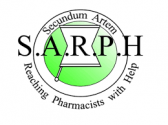FAQ
When can I check in to see if I am selected for a screen?
What are the requirements for application for or renewal of a Pharmacy license in Pennsylvania?
Pennsylvania State Board of Pharmacy Requirements
- 30 hours of continuing education must be completed by by September 30 of even numbered year.
- 2 hours must be completed in the ACPE topic designator “Patient Safety.”
- For pharmacists with the authorization to administer injectable medications, biologicals and immunizations 2 hours shall concern the administration of injectable medications, biologicals and immunizations, including disease epidemiology, vaccine characteristics, injection technique, emergency response to adverse events and related topics. Home study must be approved by ACPE.
Can I be in SARPH without the involvement of the State Board of Pharmacy?
Yes. SARPH can monitor pharmacists without the involvement of the State Board in several instances:
- The pharmacist has not had any legal charges.
- The pharmacist is attempting to reinstate a suspended license.
What makes me eligible for enrollment in the SARPH monitoring program?
You are eligible for enrollment in our program if you are a pharmacist or pharmacy intern who has been diagnosed with a substance use disorder or a psychological and/or mental health disorder such as bi-polar disorder, psychosis, and schizophrenia. Enrollment requires entrance into a monitoring contract with SARPH and an agreement to comply with the terms and conditions. You voluntarily sign a contract with SARPH as a commitment to your recovery.
Are there any costs associated with the program?
What are the key components of monitoring with SARPH?
Total Abstinence: SARPH is an abstinence-based program. Participant must maintain total abstinence from any and all addictive substances and alcohol. This includes products that contain alcohol, kratom, bath salts, any substance that potentially contains THC, one of the active components on cannabis, or any mood altering substance.
Random Drug Screening: average cost $32 – $50 per screen plus collection fee charged by the collection site.
Treatment: Evaluation – average cost free to $125
Twelve Step Meeting Attendance: FREE. Participants must agree to participate in 12 step recovery meetings and submit verification of attendance.
Healthcare Professional Group: Pharmacists will enroll in a health care professional group following discharge from the higher intensity treatment programs. This group meets on a weekly basis.
Monitored Practice: Employers or potential employers must be aware of your participation in the monitoring program. Confidentiality is our priority. We will obtain a release for your direct supervisor and all correspondence will be directed through that person
I was suspected of taking drugs from my employer - what should I do?
Contact SARPH immediately for assistance so that we can gather information and guide you through the referral and reporting process.
My employer said they have to report me to the Attorney General’s Office, the DEA, and the local police — what will happen?
Employers have a legal requirement to notify these agencies if there is a suspicion of diversion. You may be contacted by any of these agencies. Contact SARPH and we can assist you in finding legal representation. Attorneys should be experienced with both criminal law and administrative law when dealing with the Board of Pharmacy. It is important they understand the effect a criminal plea may have on your license.
My employer said they are reporting me to the Board of Pharmacy — what will happen?
A complaint to the Board of Pharmacy will be referred to the PHMP (Professional Health Monitoring Program), whose role it is to determine the likelihood of of your practice being a danger to the public. That determination will be based largely in part on the results of an drug and alcohol and/or a mental health evaluation by an approved provider. You may receive a letter from the PHMP, however, SARPH is available to Pharmacist at any time, and we encourage you to contact us before you receive the letter.
What are the rules for the reporting crimes and disciplinary action?
- A disciplinary action taken by a licensing agency or another jurisdiction.
- A finding or verdict of guilt, an admission of guilt, a plea of Nolo Contendere, probation without verdict, disposition in lieu of trial or an accelerated rehabilitative disposition (ARD) of any felony or misdemeanor offense.
How do I file a report to the Board of Pharmacy?
- Google PA PALS (must set up an account)
- Mandatory reporting selection for licensees
- Google PA Department of State
- File a Complaint on right hand side
- Select Professional/Occupational in 1st question
- Place “Licensee” in the 2nd question to indicate self-report
